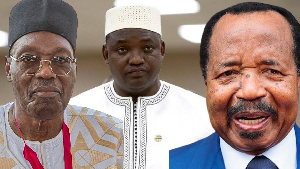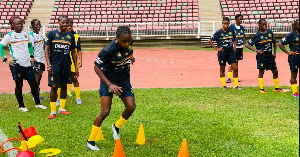More than every other consideration, the visit of the Chadian Head of State to Cameroon over the weekend is a vindication of the ever-so expressed desire to see African heads of State and, more especially neighbours, come together to find solutions to purely African problems.
Chad and Cameroon are collateral victims to happenings around their common borders with the Boko Haram insurgency with its daily intensity of attacks and hostage takings as well as the strife in the Central African Republic as the main focus of discontent.
Initially as a purely Nigerian problem, Boko Haram has become a regional headache, affecting all the neighbouring countries of Nigeria. Cameroon has taken an un-usually-high toll of problems with numerous attacks leading to death and repeated hostage takings. Just like Cameroon, Chad has also been accused of a laxity of sorts in the fight against the insurgency because of purely internal policy considerations rather than for any other reason such as wanting the problem to blow out.
Many of the unfortunate and much-decried incidents of Boko Haram occur right on the doorsteps of the two countries and it was only reasonable that the two countries get together, at the highest level of decision-making to take definitive and resolute decisions on ways of stemming the growing tide of insecurity and discomfort within the ranks of ordinary populations engendered by the Boko Haram palaver.
May be it was an attempt to giving a local coloration of, and an adaptation to the decisions taken at the May 17, 2014 Paris summit on security in Nigeria attended by other Heads of States bordering Nigeria with the participation of France and other stake-holders from around the world.
These exchanges and, more specifically, the summit between Presidents Deby Itno and Paul Biya must be seen as a vindication of the desire to work closely in the fight against Boko Haram because the scourge has taken a scope that no individual nation can keep its influence at bay without the support of others; so it is either working together or sinking together with Boko Haram because its nefarious effects go beyond State borders.
But Chad and Cameroon, beyond these considerations, also have some areas of common interest which, if well tapped and used, can bring immediate prosperity to peoples of the two countries. With a long common border and common geographical characteristics on the two sides of the border, Chadians and Cameroonians share a common cultural and economic heritage which obligates them to cooperate.
Cooperation is already rife, but not exemplary enough to encompass all the possibilities that exist and which can better benefit the peoples of the two nations. Cameroon for now provides transport for most of the imported manufactured goods coming into Chad. The transit system is problem-decked and the main land routes into Chad are overused, causing a rapid degradation of these surface routes. President Deby Itno’s visit also came to revive the old files on the Ngaoundere-N’Djamena railway which has been in the drawing boards for a little too long.
Now, there is talk about the “forthcoming signing of the project to construct a railway line between Ngaoundere and N’Djamena”. There is also the forthcoming signing of the “agreement on the terms and conditions for the construction of the second border bridge over River Logone, between Kousseri and N’gueli”. The quotes are abstracts from a joint statement at the end of the visit of President Deby Itno issued last May 22, 2014. The first reading of this statement is a clear determination to work together.
Opinions of Tuesday, 27 May 2014
Auteur: Nkendem Forbinake














